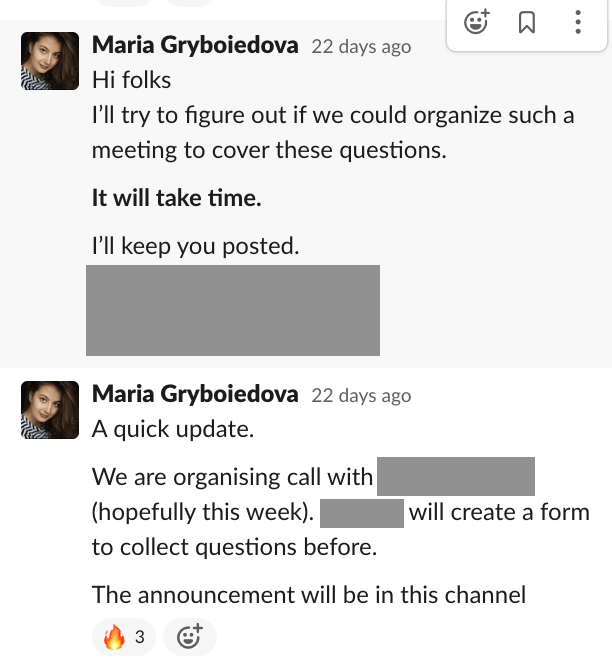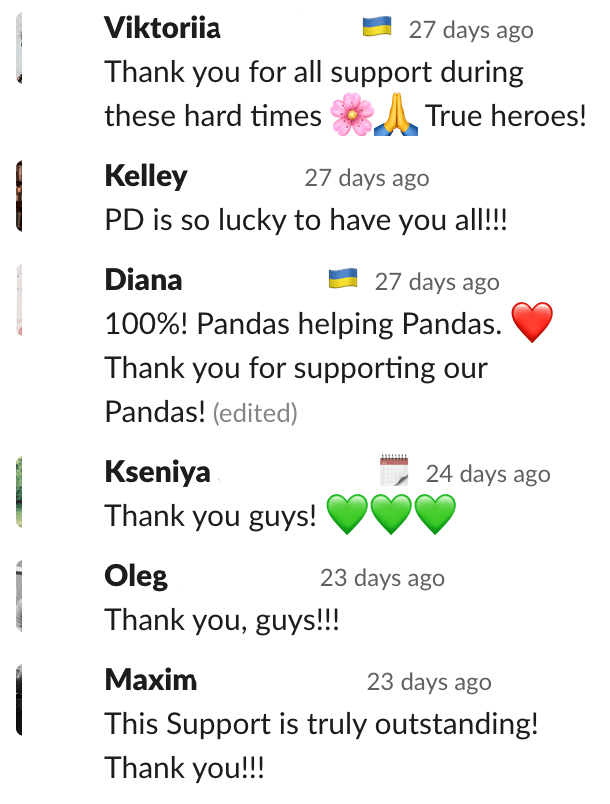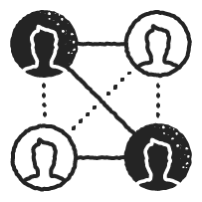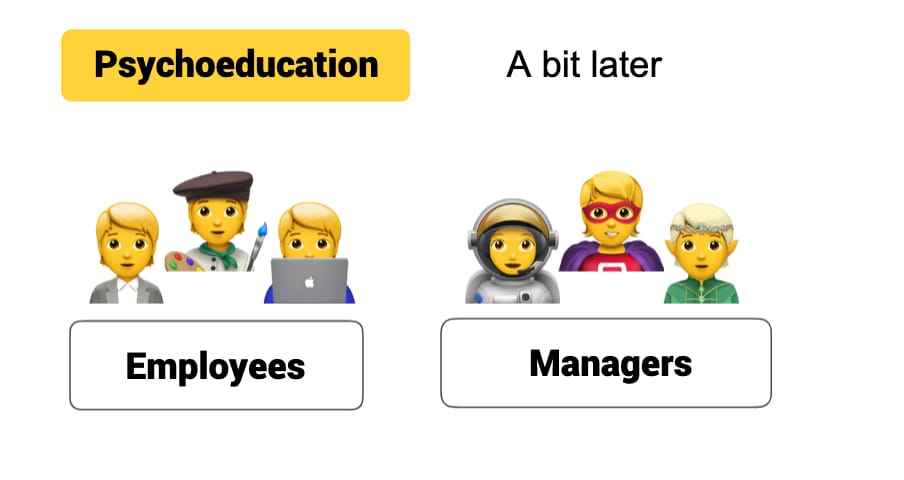How to Support Employees Affected by War and Crises
Once Russia invaded Ukraine in February 2022, Ukrainians needed to evacuate and work had to be replanned. Given this tragically difficult event, individuals and companies are still trying to get out of shock. Managers and HR partners keeping up with global and local news must understand that these events may shatter people who haven’t even been directly affected by the war. It’s critical to support your employees during these chaotic times. Here’s how to approach the issue.
PandaDoc is a B2B SaaS software company founded in 2013. We have approximately 750 employees, 173 of which are from Ukraine. We lovingly refer to them as Pandas.


How we’ve handled the Ukraine crisis
Our direct response to the situation has been to support our people in every imaginable way. We started by immediately evacuating our Pandas and providing financial support to them.
For example, during the very first days of the war, several Pandas from Ukraine were at a company meeting in Portugal. They had return tickets and were planning a home return when the invasion began. PandaDoc prolonged their Portugal stay for a week so they could remain in one place, cope with the shock, and consider what to do next. The company then booked places where people could stay for a longer period.
Looking back now, we’ve helped in several ways:
- Communication
- Logistical help
- Work with company leadership
- Access to mental health sessions
- The importance of emotional maturity in HR
Communication
Communication is crucial, and discussing changes openly with your employees is especially necessary during moments of turbulence. So, communication should be:
- Open. It's essential to be honest about how things are at the moment. It's not about answering every question — it’s perfectly OK to say “We don’t know.”
Otherwise, uncertain and vague answers can lead to more stress, so it’s best to say, “We’re not sure since we haven't faced this situation before. Let’s connect with the agency and try to figure it out.”
We’ve gotten unexpected, but important questions from our Pandas. For example, some have asked how to pay taxes in other countries, how soon they could obtain a residence card in Portugal, or how to pay for a hotel in a safe area in the Carpathians in Ukraine. Our HR partner took time to absorb as much information as possible and come back with answers.

- Consistent. We provide regular updates during our company-wide all-hands meetings every other week. During these gatherings, we remind everyone of our company mission, vision, and values, we discuss the current status of Pandas in different countries, we set new goals and check key results, we welcome new team members, and we celebrate promotions.
- Timely. If something significant can’t wait and will have an immediate impact, we don’t wait to share an update.
- Repetitive, as necessary. While it might sometimes seem that we’ve already discussed certain important points and no more communication is needed, in reality, it’s worth repeating. Why? Because someone may have missed an update, or perhaps critical details were omitted. It never hurts to go over something important again.
- Thorough. It’s important to understand where to direct information, and to ensure it reaches the right person. As an international company, PandaDoc has employees all over the world. While US team members may not need regular updates, Ukrainians waiting for relocation need further details, such as the number of the bus for evacuation and their budget allowance. So, we provide this information personally to those who need it. We also take care to check the status of the situation during our leadership calls, as a manager could have people on their team from Ukraine, Belarus, and Russia.
What did we communicate about?
- Updates on our business
- Company position
- Overview of the current situation with Pandas
- What the company’s doing for Pandas
- What we’re working on
- Words of support ❤️
- Meetings about relocation issues, etc.
Words of support have become one of our most powerful tools. It’s been important for Pandas to know that the company will help look after them during these hard times, and that there’s a safe place to discuss concerns openly.

We immediately offered recordings of mental health sessions to our team. Later, we’ve created a Ukrainian Emergency Knowledge Base — all necessary info about the situation in one place.


Logistical help
We’ve added extra budget for employees to use for relocation, mental health support, and anything necessary for their safety. Also, our HR team has pitched in to help find and book accommodation, organize evacuation buses, help with documents, and so on. Pandas have mostly spent this additional budget on booking accommodation, tickets and fuel, and most sweetly, travel documents for pets.
Work with company leadership
As always, we collaborated closely with internal leaders by providing them with information on processes and operational changes. For example, in the first weeks of the Ukraine crisis, we held a meeting with the PandaDoc leadership team and covered the following:
- Where are Pandas who’ve remained in Ukraine? And what is their status?
- What is PandaDoc doing to support Pandas in Ukraine? 🇺🇦
- What do managers need to do?
- How can we lead with empathy?
We’ve ensured that managers have received this info before anything is announced to the entire company. We’ve also provided managers with an opportunity to get their questions answered — so when their employees come to them, they’ll be fully prepared to discuss anything that comes up.

.jpg)
Also, we talk regularly with managers, one-on-one, so we know what’s going on with their employees and how we can help. Our HR team has provided support on request if conflict situations have arisen.


Access to mental health sessions
Once the time was appropriate after the war began, we began offering mental health sessions to the entire company. Licensed psychologists have worked with our team, facilitating sessions on these crucial topics:
- How to deal with stress
- The psychology of trauma
- How to restore productivity
Furthermore, we’ve offered additional educational sessions for managers on, for example, the role of a leader during a crisis. We’ve also organized workshops to help managers determine who needs help, what they can do (and what they can’t), and how to use feedback to help employees regain their productivity.

We’ve routinely conducted regular Lattice Pulse surveys to monitor changes. Predictably, the data has shown a decrease in self-efficiency, motivation, and engagement during the first months of the war. On the other hand, all our steps mentioned above led to a boost in the company’s commitment to Pandas, manager support, job satisfaction/fit, and a sense of belonging. For example, leadership indicators increased by over 14%, and support by 3%.
The importance of emotional maturity in HR
I genuinely believe it’s crucial for HR partners to develop emotional intelligence and awareness. This way, they can:
- Become aware of opportunities to help, then follow through
- Delegate, say no, and/or ask for help when necessary
- Avoid hurting others, since emotions can make it difficult to control reactions
- Exercise self-care — for example, knowing when to take a break or understanding how to keep yourself productive

HR BP Lead for R&D
What helped me develop this personally?
Being Ukrainian myself, I experienced the same feelings as other people. Also, I moved to another country and worked without days off to support others. Years of therapy, as well as holding a Master’s Degree in Psychology, have helped me a lot. This way, I could understand my limitations and the things I could influence.
Also, I became highly focused during the first months of the war. That was my way of managing stress. However, I know it’s easy to miss the moment when exhaustion takes hold, so when the situation eased, I took a vacation.
Here are a few books I’ve found to be particularly helpful:
- Nonviolent Communication: A Language of Life by Marshall Rosenberg
- How Emotions Are Made by Lisa Feldman Barrett
- The Search for Existential Identity: Patient-Therapist Dialogues in Humanistic Psychotherapy by James Bugental.
Finally, I’ve learned how to support myself and, when necessary, ask for help. If I’ve ever felt overwhelmed, I know I can ask my teammates to pitch in. There have been simple daily actions to get back to myself, such as practicing pilates, getting a massage, or working less.

Distributed Teams and Home Offices. Work in a New Reality
Since 2020, the world has been in turmoil. And these days, the usual workflow is no longer what it used to be: no commute, no coffee queue, no one dropping by your desk to say hi. The events of 2022 have made even more of us work from different places and time zones. PandaDoc has adapted to this new reality of remote working environments — here’s how we’ve done it effectively.

Recovery and Coming Back to Work
If you’re wondering how to ignore stress, the answer would be “It’s impossible — and not always necessary.” A stress reaction is natural, and it’s what makes us human. We talked about this with psychologist Aleksandra Zinkova and shared our own experiences of how specific recommendations worked for us.

From COVID to War: Organizing Work in Turbulent Times
If you’re wondering how to ignore stress, the answer would be «It’s impossible and not always necessary». A stress reaction is natural, and it’s what makes us humans. We talked about that to a psychologist Aleksandra Zinkova and shared our own experiences of how specific recommendations worked for us.
